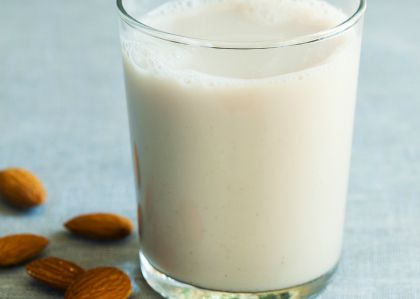
Guess How Much Almond is in Your Almond Milk
By Claire Georgiou, Reboot Naturopath, B.HSc ND
Almond milk and other dairy alternatives have gone mainstream, with shelves devoted to them at supermarkets, and they’re popping up more frequently in restaurants too.
With packaged almond milk, you’re certainly paying for convenience, but be aware that you’re not necessarily paying for many almonds. You might be surprised to know that some top brands contain only about 2% actual nuts. This means that many mainstream almond-milk brands are made of approximately 98% water and additives with only a few almonds. So if you’re buying almond milk hoping to reap the nutritional benefits of almonds, you might not be getting as much benefit as you think.
There is currently a lawsuit pending against two manufacturers of almond milk, Blue Diamond and Silk, asserting that these products’ packaging misleads consumers into assuming a much greater percentage of almonds than the 2% they actually contain. Manufacturers are not currently required to list the percentage of almonds on packaging, so it’s impossible to know the percentages in various brands.
Perhaps more concerning than the percentage of almonds in the products, are some of the other ingredients in packaged almond milk. There’s good reason to question whether you want to include them in your diet.
Questionable carrageenan
A frequent additive to almond milk and other dairy-milk alternatives, this ingredient is used as a stabilizing and thickening agent to give non-dairy milks a more milky appearance and texture.
In the United States, the Food and Drug Administration (FDA) states that carrageenan is safe when used at current levels, but concludes that more study is needed. In a large review published in the journal “Environmental Health Perspectives,” research indicates that carrageenan may contribute to digestive issues, ulcerations, inflammation and possibly cancer.
In my view, the addition of carrageenan does not provide any nutritional value; it’s only used to alter the product’s consistency so what’s the point, especially if it’s potentially harmful.
Not every product contains carrageenan, so check the label.
Other additives to dairy-milk alternatives
Flavors, stabilizers, emulsifiers and sugar may also be added to packaged almond milk and other nut milks. Again, safety aside, these ingredients offer no nutritional benefit.
Better almond milk
When almond milk contains more actual almonds, nutrient value goes up. Protein and healthy fat content are higher. And with a larger percentage of almonds, you will also increase feelings of satiety and fullness, with more flavor and a nicer consistency.
Homemade almond milk recipes typically call for 1 cup of almonds to 2 to 4 cups of filtered water, so making your own should result in about 10 to 20% almonds rather than the 2% you’ll find in store-bought versions. If you choose to leave in the almond milk pulp, there can be up to 25% to 50% almonds in your milk.
Almond milk and other nut milks can be a delicious and healthy addition to any smoothie and as a healthy alternative to regular dairy milk.
Almonds themselves are a great source of protein, healthy plant fats, Vitamin B3, Vitamin E, calcium, magnesium, zinc, iron and flavonoids, and they have been correlated to a reduction in heart disease, diabetes and cancer.
Making your own non-dairy milk is typically healthier, and often less expensive than store bought, and it’s really easy to do. Here are some recipes to try:
- Homemade Almond Milk
- Creamy & Sweet Coconut Almond Milk
- Cinnamon Almond Milk
- Homemade Cinnamon Hazelnut Milk
- Homemade Coconut Milk
- Brazil Nut Chai Tea Latte
If you choose to purchase store bought nut milks, then looking for the highest protein and fat content is the best way to get an idea of the percentage of nuts, which typically won’t be listed on the label. Also look for products that do not contain added flavors, carrageenan or sugar. Here is a helpful guide from HealthyEater.com on commercial brands in the US, Australia and Canada. (Keep in mind that recipes frequently change, so always double check labels.)
There are many reasons why dairy milk is not all it’s cracked up to be. Consuming alternatives, all or some of the time, can certainly be helpful for your health.
See our related articles: The Milk Myth and Why You Don’t Need Milk For Calcium and Dairy Alternatives That Give You Calcium.